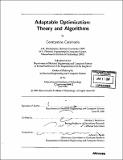Adaptable optimization : theory and algorithms
Author(s)
Caramanis, Constantine (Constantine Michael), 1977-
DownloadFull printable version (26.35Mb)
Other Contributors
Massachusetts Institute of Technology. Dept. of Electrical Engineering and Computer Science.
Advisor
Dimitris J. Bertsimas.
Terms of use
Metadata
Show full item recordAbstract
Optimization under uncertainty is a central ingredient for analyzing and designing systems with incomplete information. This thesis addresses uncertainty in optimization, in a dynamic framework where information is revealed sequentially, and future decisions are adaptable, i.e., they depend functionally on the information revealed in the past. Such problems arise in applications where actions are repeated over a time horizon (e.g., portfolio management, or dynamic scheduling problems), or that have multiple planning stages (e.g., network design). The first part of the thesis focuses on the robust optimization approach to systems with uncertainty. Unlike the probability-driven stochastic programming approach, robust optimization is built on deterministic set-based formulations of uncertainty. This thesis seeks to place Robust Optimization within a dynamic framework. In particular, we introduce the notion of finite adaptability. Using geometric results, we characterize the benefits of adaptability, and use these theoretical results to design efficient algorithms for finding near-optimal protocols. Among the novel contributions of the work are the capacity to accommodate discrete variables, and the development of a hierarchy of adaptability. (cont.) The second part of the thesis takes a data-driven view to uncertainty. The central questions are (a) how can we construct adaptability in multi-stage optimization problems given only data, and (b) what feasibility guarantees can we provide. Multi-stage Stochastic Optimization typically requires exponentially many data points. Robust Optimization, on the other hand, has a very limited ability to address multi-stage optimization in an adaptable manner. We present a hybrid sample-based robust optimization methodology for constructing adaptability in multi-stage optimization problems, that is both tractable and also flexible, offering a hierarchy of adaptability. We prove polynomial upper bounds on sample complexity. We further extend our results to multi-stage problems with integer variables in the future stages. We illustrate the ideas above on several problems in Network Design, and Portfolio Optimization. The last part of the thesis focuses on an application of adaptability, in particular, the ideas of finite adaptability from the first part of the thesis, to the problem of air traffic control. The main problem is to sequentially schedule the departures, routes, ground-holding, and air-holding, for every flight over the national air space (NAS). (cont.) The schedule seeks to minimize the aggregate delay incurred, while satisfying capacity constraints that specify the maximum number of flights that can take off or land at a particular airport, or fly over the same sector of the NAS at any given time. These capacities are impacted by the weather conditions. Since we receive an initial weather forecast, and then updates throughout the day, we naturally have a multistage optimization problem, with sequentially revealed uncertainty. We show that finite adaptability is natural, since the scheduling problem is inherently finite, and furthermore the uncertainty set is low-dimensional. We illustrate both the applicability of finite adaptability, and also its effectiveness, through several examples.
Description
Thesis (Ph. D.)--Massachusetts Institute of Technology, Dept. of Electrical Engineering and Computer Science, 2006. Includes bibliographical references (p. 189-200).
Date issued
2006Department
Massachusetts Institute of Technology. Department of Electrical Engineering and Computer SciencePublisher
Massachusetts Institute of Technology
Keywords
Electrical Engineering and Computer Science.